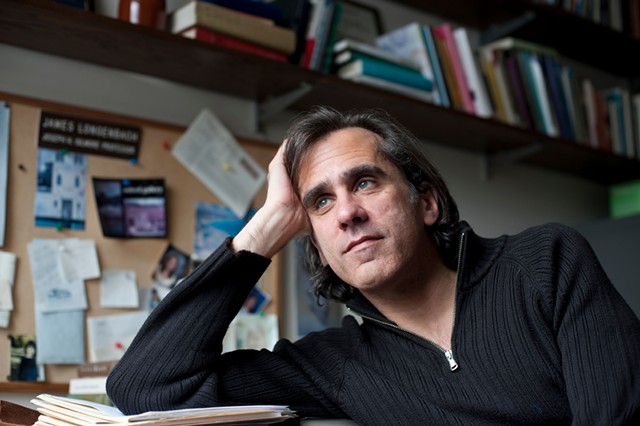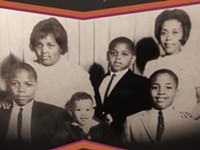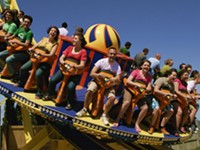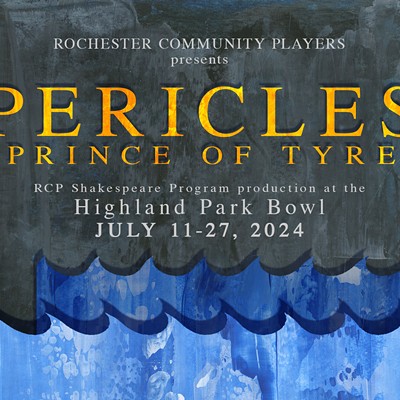James Longenbach, U of R prof who wrote about poetry for the masses, dies at 62
By Daniel J. Kushner @danieljkushner[
{
"name": "500x250 Ad",
"insertPoint": "5",
"component": "15667920",
"parentWrapperClass": "",
"requiredCountToDisplay": "1"
}
]
James Longenbach, a poet and longtime University of Rochester professor whose prolific writings on poetry for mainstream media publications helped keep the art form in the public eye and explained its complexities to the masses, died July 29 at his home in Stonington, Connecticut.
He was 62 and his family said the cause was complications from kidney cancer.
To call Longenbach a giant in the field of poetry would not be an exaggeration. He was once hailed in The New York Times as “one of the finest scholar-critics working today,” and his poetry, as well as his commentary on the subject, was frequently published in that outlet and others, including The Nation, The New Republic, and The New Yorker. He was also a regular contributor to several “Best American Poetry” anthologies.
“Few people are able to write lyrical poems that convincingly inhabit the border country between the familiar and the unknowable,” the poet Jesse Lichtenstein wrote of Longenbach in 2005. “Few people write about poetry with agility, wisdom, and unfailing generosity towards subject and reader. How many fewer do both? And bring to each effort a vast learning, worn as lightly as the task allows? Which is to say there are very few people today writing like James Longenbach.”
Throughout his career, Longenbach penned six books of poetry, including 2017’s “Earthling,” which was a finalist for the National Book Critics Circle Award, and “Forever,” which was published in 2021 and was inspired by his contemplations on mortality after his diagnosis.
“It seems like the simplest truth in the world, this understanding that our lives are finite,” the University of Rochester quoted him as saying in a news release announcing the publication of his book. “I thought I had grappled with that — but it turns out I had not.”
His poem “The Village” in that collection illustrated Longenbach embracing living in the moment while staring down death.
The sentences I’ve just written
Took it out of me.
I searched for the words,
And I resisted them as soon as I put them down.
Now, listening to them again, what I hear
Is not so much nostalgia
As a love of beginning. A wish
Never to be removed
From time but
Always to be immersed in it, always looking forward,
Never behind.
The boats come in,
The boats go out—
Longenbach joined the University of Rochester as a professor in 1985 after earning his doctoral degree in English from Princeton University. He taught classes on Shakespeare and Joyce and on topics ranging from British and American modernism to contemporary American poetry.
“He gave a lot of us a more sophisticated vocabulary to talk about poetry,” said fellow professor Jennifer Grotz. “And again, breaking it down to formal choices, and not, as you were saying, romantic notions about self-expression or the soul. He was really interested in sentences and syntax and diction, and using English, using language as an artistic medium the same way a painter would use paint.”
Ilya Kaminsky, the Ukrainian-American poet and a U of R alumnus, considered Longenbach a mentor. He said the professor would spend hours discussing great modern poets such as Robert Frost, Robert Lowell, and Derek Walcott, going through their work line by line.
“Such love of subject and generosity of spirit is rare,” Kaminsky said.
“As for his scholarship and literary criticism, he was unparalleled,” Kaminsky said. “I do not put that statement lightly: the learning, the ability to share that learning with grace and balance, with insight and yes, generosity, was one of a kind. It pains me to say ‘was.’ ‘Is’ is a better word because the books are here with us.”
In addition to writing poetry, Longenbach was also a prominent writer about poetry. He wrote several books of criticism, including “Modern Poetry After Modernism” from 1997, “The Resistance to Poetry” in 2004, and 2018’s “How Poems Get Made.”
Longenbach was enamored with poetry, but resisted romanticizing it or overstating its place in modern culture. When once asked by Aspen Matis, of “The Best American Poetry” blog, about poetry’s role in society, Longenbach replied, “I’m not sure there is one, though it’s important to believe there is one.”
He saw poetry’s cultural obscurity as a blessing in disguise. In a 2007 book review for The New York Times, he wrote, “The strength of American poetry depends on the fact that hardly anybody notices it. To emerging poets, eager for an audience, this marginality may seem frustrating, but it is the source of their freedom.”
Longenbach dedicated his working life to poetry but found time for other pursuits. He was known to family and friends as a good dancer and avid musician who played the piano and the lute, and once built his own harpsichord. His musical tastes were diverse, ranging from Taylor Swift to Beethoven.
Longenbach is survived by his wife Joanna Scott — an English professor and director of literary arts programs at U of R — and their two daughters.
Daniel J. Kushner is CITY's arts editor and can be reached at [email protected].
He was 62 and his family said the cause was complications from kidney cancer.
To call Longenbach a giant in the field of poetry would not be an exaggeration. He was once hailed in The New York Times as “one of the finest scholar-critics working today,” and his poetry, as well as his commentary on the subject, was frequently published in that outlet and others, including The Nation, The New Republic, and The New Yorker. He was also a regular contributor to several “Best American Poetry” anthologies.
“Few people are able to write lyrical poems that convincingly inhabit the border country between the familiar and the unknowable,” the poet Jesse Lichtenstein wrote of Longenbach in 2005. “Few people write about poetry with agility, wisdom, and unfailing generosity towards subject and reader. How many fewer do both? And bring to each effort a vast learning, worn as lightly as the task allows? Which is to say there are very few people today writing like James Longenbach.”
Throughout his career, Longenbach penned six books of poetry, including 2017’s “Earthling,” which was a finalist for the National Book Critics Circle Award, and “Forever,” which was published in 2021 and was inspired by his contemplations on mortality after his diagnosis.
“It seems like the simplest truth in the world, this understanding that our lives are finite,” the University of Rochester quoted him as saying in a news release announcing the publication of his book. “I thought I had grappled with that — but it turns out I had not.”
His poem “The Village” in that collection illustrated Longenbach embracing living in the moment while staring down death.
The sentences I’ve just written
Took it out of me.
I searched for the words,
And I resisted them as soon as I put them down.
Now, listening to them again, what I hear
Is not so much nostalgia
As a love of beginning. A wish
Never to be removed
From time but
Always to be immersed in it, always looking forward,
Never behind.
The boats come in,
The boats go out—
Longenbach joined the University of Rochester as a professor in 1985 after earning his doctoral degree in English from Princeton University. He taught classes on Shakespeare and Joyce and on topics ranging from British and American modernism to contemporary American poetry.
“He gave a lot of us a more sophisticated vocabulary to talk about poetry,” said fellow professor Jennifer Grotz. “And again, breaking it down to formal choices, and not, as you were saying, romantic notions about self-expression or the soul. He was really interested in sentences and syntax and diction, and using English, using language as an artistic medium the same way a painter would use paint.”
Ilya Kaminsky, the Ukrainian-American poet and a U of R alumnus, considered Longenbach a mentor. He said the professor would spend hours discussing great modern poets such as Robert Frost, Robert Lowell, and Derek Walcott, going through their work line by line.
“Such love of subject and generosity of spirit is rare,” Kaminsky said.
“As for his scholarship and literary criticism, he was unparalleled,” Kaminsky said. “I do not put that statement lightly: the learning, the ability to share that learning with grace and balance, with insight and yes, generosity, was one of a kind. It pains me to say ‘was.’ ‘Is’ is a better word because the books are here with us.”
In addition to writing poetry, Longenbach was also a prominent writer about poetry. He wrote several books of criticism, including “Modern Poetry After Modernism” from 1997, “The Resistance to Poetry” in 2004, and 2018’s “How Poems Get Made.”
Longenbach was enamored with poetry, but resisted romanticizing it or overstating its place in modern culture. When once asked by Aspen Matis, of “The Best American Poetry” blog, about poetry’s role in society, Longenbach replied, “I’m not sure there is one, though it’s important to believe there is one.”
He saw poetry’s cultural obscurity as a blessing in disguise. In a 2007 book review for The New York Times, he wrote, “The strength of American poetry depends on the fact that hardly anybody notices it. To emerging poets, eager for an audience, this marginality may seem frustrating, but it is the source of their freedom.”
Longenbach dedicated his working life to poetry but found time for other pursuits. He was known to family and friends as a good dancer and avid musician who played the piano and the lute, and once built his own harpsichord. His musical tastes were diverse, ranging from Taylor Swift to Beethoven.
Longenbach is survived by his wife Joanna Scott — an English professor and director of literary arts programs at U of R — and their two daughters.
Daniel J. Kushner is CITY's arts editor and can be reached at [email protected].
Speaking of...
-

Poetry and pistols
Nov 11, 2022 -

Unlocking Parkinson's one selfie at a time
Dec 28, 2021 -

Haunting HIV/AIDS posters are now art in new RIT Press book
Dec 1, 2021 - More »
Latest in Literature
More by Daniel J. Kushner
-
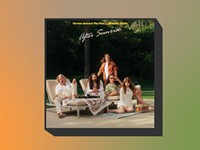
Album Review | 'After Sunrise'
Apr 9, 2024 -
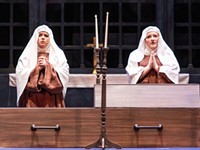
Opera Review | 'Dialogues des Carmélites'
Apr 5, 2024 -
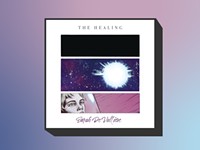
Music Review | 'The Healing'
Apr 4, 2024 - More »
